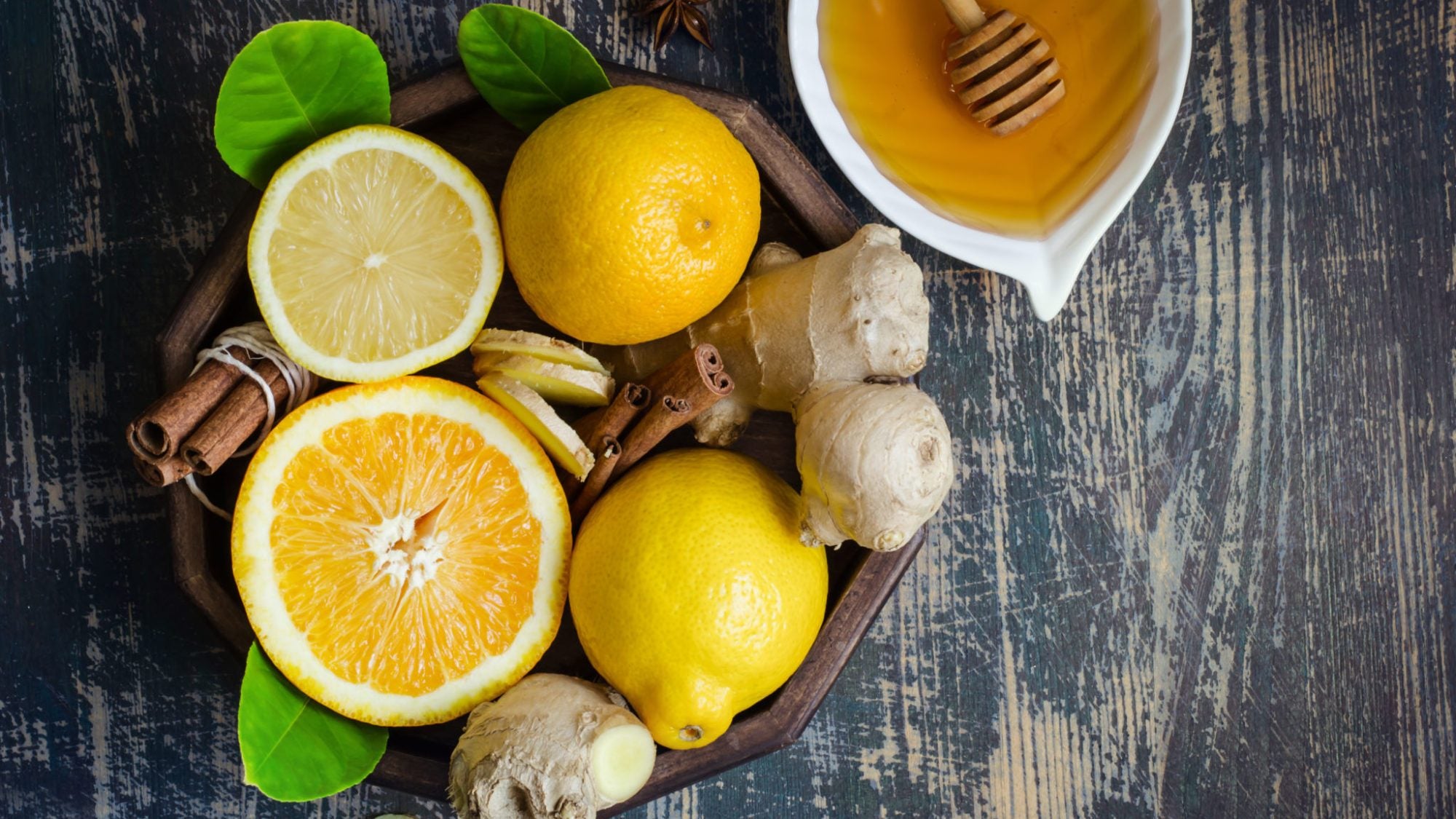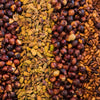The Best Ways To Boost Immune Health

Everything can fight for your attention until you get sick. Then only one thing matters: getting better.
But what if we were all more proactive about our health, even in times when we are well? Paying attention to these daily ways to boost your immune health could help your body fight off illnesses, minimize the severity of symptoms, or recover faster.
Five ways to boost immune health
1. Exercise regularly
Wondering how to fight off potential viruses? Regular, consistent exercise can help your body fight off upper respiratory illness, according to one study. Data from the research implies an inverse relationship between physical activity and the rates of an upper respiratory tract infection [1].Those who exercised at least five days a week had almost half the risk of coming down with a cold virus compared to their more sedentary counterparts. The active participants who did get sick had fewer symptoms.
But when you're exercising, make sure you're not overdoing it. If strenuous exercise puts your body under so much stress that it is not able to recover, it can depress your immune system.
The Department of Health and Human Services recommends at least 150 minutes per week (that's 30 minutes per day, five days per week) of moderate-intensity aerobic activity, like biking, swimming, walking, or sports. They also recommend muscle-strengthening exercise in the form of weight training or resistance training at least two days per week [2].
2. Minimize stress
The very idea of being sick can be stressful in and of itself. No matter what challenges you may face daily, specific techniques can help to reduce stress in your body and help keep your immune system healthy.Chronic psychological stress leads to a higher risk of illnesses like depression, cardiovascular disease, diabetes, autoimmune diseases, and yes, upper respiratory infections [3].
In one study, a group of healthy adult volunteers were exposed to one of two rhinoviruses and monitored to see who developed a cold. The subjects who had experienced recent long-term stressful events were more at risk of developing a cold, and the stressful event also predicted higher inflammation in those subjects [4].
But there are ways to manage stress even under challenging situations. Meditation and exercise are two promising preventative measures. One study sought to find ways to prevent acute respiratory infection in healthy adults and found that training in meditation or exercise may be effective in reducing acute respiratory infection [5].
According to the American Psychological Association, developing a meditation practice has other benefits as well [6], including:
- Reduced rumination
- Stress reduction
- Boosts to working memory
- Focus
- Less emotional reactivity
- More cognitive flexibility
- Relationship benefits
3. Get adequate sleep
Insufficient sleep is linked to a variety of diseases. People who get less than seven to nine hours of sleep per night are more susceptible to suffer from chronic ailments.According to sleep expert and neuroscientist Matthew Walker, if you're getting an average of 6 hours of sleep or less per night, your time to physical exhaustion drops by up to 30% [7].
A 2015 study linked less sleep to higher susceptibility to the common cold [8], so it is reasonable to assume that it could correlate to other illnesses as well.
Aim for an average of 7-9 hours per night, and focus on quality by sleeping in a cool, dark room and going to bed at a decent hour.
4. Wash hands frequently
When it comes to infectious diseases, washing your hands is of vital importance. According to the Centers for Disease Control and Prevention (CDC), it is one of the top ways to protect yourself and your family from getting sick [9].Here is the complete list of when to wash your hands, according to the CDC [10]:
- Before, during, and after preparing food
- Before eating food
- Before and after caring for someone at home who is sick with vomiting or diarrhea
- Before and after treating a cut or wound
- After using the restroom
- After changing diapers or cleaning up a child who has used the toilet
- After blowing your nose, coughing, or sneezing
- After touching an animal, animal feed, or animal waste
- After handling pet food or pet treats
- After touching garbage
5. Eat a variety of healthy foods
A key to supporting your body's immune defenses is first to make sure you are eating enough food. Your immune system needs proper, regular nourishment. It's accepted knowledge in the scientific community that people who live in poverty and are malnourished are more vulnerable to infectious diseases [11].Eating a diverse diet can help to fill in micronutrient deficiencies and ensure you are getting the recommended amount of essential vitamins and minerals. The most important micronutrients for immune health are vitamins A, C, D, E, B2, B6, and B12, folic acid, iron, selenium, and zinc [12].
Micronutrient deficiencies - where lack of a single nutrient leads to a specific illness - are recognized as a global health issue, and can predispose people to certain infections. Real micronutrient deficiencies are rare in the United States. But getting less than the recommended amount can contribute to a variety of significant illnesses [13]. Diet is the best way to fill in these gaps.
Vitamins and minerals that can enhance immune health
As mentioned above, there are specific micronutrients that your immune system needs to function correctly. Here are five of them to focus on, especially on a ketogenic diet.Vitamin C
Vitamin C may be the first vitamin you think of when it comes to immune health. Here's how it works. Vitamin C is a potent antioxidant that helps replenish your body's immune cells so they can operate at their peak performance [14].Your body may process vitamin C differently on a ketogenic diet due to the amount of glucose that you are not eating. More glucose intake means you generally need more vitamin C intake for the immunity effects [15].
Most people do not need to supplement with vitamin C, as they get adequate amounts from their diet. But vitamin C is a water-soluble vitamin, so supplementing with it is reasonably safe.
Vitamin D
Vitamin D helps your immune system activate fighter T cells, which can help keep you healthy [16]. Most people know that you can get vitamin D by being outside in the sunshine, but there are many food sources as well. Good keto sources include salmon, tuna, organ meats, and eggs.Many Americans have a vitamin D deficiency, keto or not, so supplementing with it is often recommended to achieve optimal levels [17]. Check with your doctor to see whether vitamin D supplements are right for you.
Vitamin E
Vitamin E is a fat-soluble vitamin found from plant-based sources. It is a potent antioxidant that has various benefits for the immune system. It works multiple ways to help maintain a thriving immune system, especially in those who are aging [18].Avocados, spinach, and asparagus are all low-carb options that provide vitamin E [19].
Vitamin B6
Multiple studies suggest that vitamin B6 deficiency is linked to a decreased immune response in both animals and humans. Some studies even indicate that vitamin B6 may influence tumor growth and disease processes [20].Most people get adequate amounts of vitamin B6 from food, but certain groups with existing illnesses may need to supplement for the adequate amount [21].
Vitamin B6 is found in a wide variety of foods. Notable keto sources of this vitamin are in pork, fish, poultry, and eggs [22].
Zinc
Zinc is a mineral that is critical for immune health, and a deficiency can cause severe immune dysfunctions, in addition to other health ailments and developmental disabilities [23].Zinc may also reduce the severity and duration of common cold symptoms when taken during the illness [24].
Beef, oysters, pumpkin seeds, and cashews are all keto-friendly food sources of zinc. Most people do not need to supplement with zinc, but it is recommended for those with compromised gastrointestinal health, vegetarians, pregnant and nursing women, and other specific circumstances [25].
10 low-carb foods that support immune health

- Spinach*
- Broccoli*
- Bell peppers
- Garlic*
- Plain Greek yogurt*
- Bone Broth*
- Chicken
- Almonds
- Shellfish
- Avocados
The keto diet's impact on immune health
Keto isn't just good for weight loss. It also may have an effect on fighting off viral respiratory illnesses like the flu.A 2019 Yale University study showed that mice on a ketogenic diet were better at fighting off flu infections than their counterparts on a high-carb diet [29].
Keto activates a subset of T cells in the lungs that enhances mucus production from airway cells that can effectively trap the virus. It's a novel discovery, as this subset of cells was not previously associated with the immune system's response to influenza [30].
The group of mice on a standard, high-carbohydrate diet did not experience this effect, while the keto mice had a higher survival rate compared to their high-carb counterparts.
"This study shows that the way the body burns fat to produce ketone bodies from the food we eat can fuel the immune system to fight flu infection," said researcher Visha Deep Dixit on the impact of the study [31].
Also, ketones produced by the body during keto, namely BHB, may have substantial anti-inflammatory immune benefits as well [32].
"My patients who follow a well-formulated and nutrient-dense ketogenic diet see a significant decrease in inflammation, which decreases not only their risk factor for chronic disease, but improves their body's natural immunity and ability to fight off infection when they do become ill. I stress the importance of a ketogenic diet that includes colorful low-GI fruits and veggies such as dark berries and dark leafy greens to provide maximum nutrient-density while staying within the macronutrient ranges to sustain nutritional ketosis," said Registered Dietitian Molly Devine, RD.
Supplements that boost immune health
Supplementing with the micronutrients mentioned above may benefit you depending on your diet and age.Other supplements that can help boost your immune health, especially if you are on keto, include magnesium and BHB.
Magnesium
Magnesium is a key mineral for immune health, as well as being an electrolyte. On keto, replenishing electrolytes is especially important because of the way your body holds onto salt when you are in ketosis. Your body flushes out electrolytes much faster on keto, so supplementing with them is essential. Failing to properly replenish electrolytes can lead to symptoms commonly called the Keto Flu.BHB
Ketone bodies have an anti-inflammatory effect on the body, specifically the ketone body beta-hydroxybutyrate (BHB).BHB inhibits inflammation induced by a wide variety of stimuli [33]. One study found that BHB exerts antidepressant-like effects due to reducing inflammation in the brain [34].
A variety of factors, including pathogens, can induce inflammatory responses in your organs, leading to disease or tissue damage [35].
Therefore, following a ketogenic diet, which is naturally anti-inflammatory, and supplementing with BHB is one of the best ways to keep your immune response in check.
Immune-boosting recipes

The keto diet includes many immune-enhancing foods. Here are some easy recipes you can make at home which are low-carb, delicious, and can support immune health. We have listed the immune-boosting ingredients next to each recipe.
- Kale Salad: Kale, lemon, garlic
- Broccoli & Cheese Casserole: Broccoli, almond flour
- Green Egg Omelet: Eggs, kale, spinach
- Steak and Avocado Salad: Avocados, avocado oil, tomatoes, garlic, lime juice, apple cider vinegar
- Lemon Herb Butter Salmon: Salmon, lemon, garlic
Take charge of your health
While cold and flu season is an added incentive to boost your immune system, being proactive about staying healthy throughout the year is always important. Even if you can’t do everything mentioned in this article, the more you can do, the better. Eating well should be viewed as an investment in yourself and the keto diet (and the benefits it comes with) is a great way to take care of your body and your health.-
Posted in
Authority Article, Nutrition, Nutrition Article




